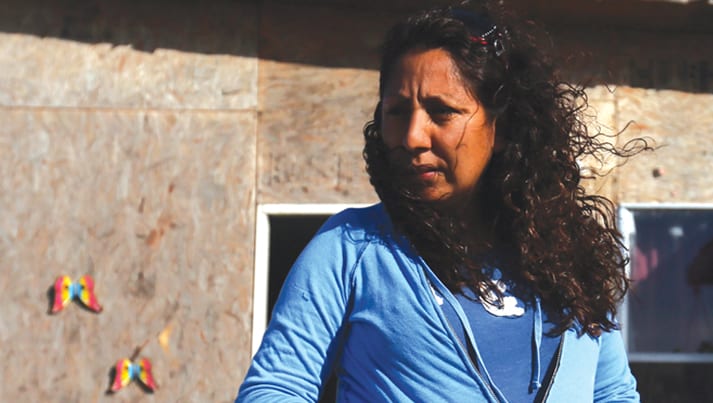A Human Rights Crisis

Nuestro Texas is a major effort that seeks to mobilize women in Texas’s Rio Grande Valley to fight for their health and human rights.
Ida was getting “desperate.” The mother of two had received a year’s supply of contraception from a family planning clinic in Texas’s Lower Rio Grande Valley before it was shuttered by reckless state budget cuts. She had only about a week’s worth left. She was terrified of what would happen when she ran out.
“Right now, I’m not prepared for another child,” said Ida. “My financial situation is rough, pretty rough… I don’t know how to get more pills because they charge for them now. [The clinics] have no funds for that. No one does now.”
Ida is one of 188 women in the Valley that we spoke to for a groundbreaking human rights report, Nuestra Voz, Nuestra Salud, Nuestro Texas: The Fight for Women’s Reproductive Health in the Rio Grande Valley. The report marks the public launch of our partnership with the National Latina Institute for Reproductive Health on a broad and sustained campaign called Nuestro Texas that supports the women of the Valley to mobilize and advocate for new policies that uphold, rather than denigrate, women’s health and human rights.
The relentless assault on women’s rights in Texas has affected all women in the state, but the hardest hit have been the most underserved: immigrant women in rural, low-income areas like the Rio Grande Valley, a largely Latino area at the southern tip of Texas.
When the Texas legislature slashed state funding for women’s preventive health care by two-thirds in 2011, the situation for women in the Rio Grande Valley went from bad to worse. The budget cuts and other policy changes were designed to limit the reach of family planning clinics, even though those facilities provide the most efficient, high-quality, and affordable reproductive health care to low-income women in rural areas. Women like Ida.
Nuestro Texas exposes the many barriers women face in the Rio Grande Valley when trying to access all health care but especially reproductive health services. Katrina Anderson, human rights counsel in the U.S. Legal Program, has been leading the effort for the Center. “The 2011 policy changes exacerbated problems that have existed for many years in an area long neglected by policy makers,” she said. “Our report captures the stories of women who struggle to get the health care they need, showing the toll these barriers have taken as well as women’s resilience in the face of such challenges.”
For many women in the area, family planning clinics have been their only health care provider. Though much of the funding slashed in 2011 was restored in 2013, the legislature has managed to steer that money away from the facilities that serve this population best. Instead, funding goes towards primary care clinics, which are generally located in urban areas and lack specialization in women’s health care and the needs of Latinas.
Meanwhile, the crisis in the Rio Grande Valley has not abated. Over the course of this long-term campaign, the Center and the Latina Institute have partnered to bring national attention to this urgent issue, and to amplify the voices of women whom Texas politicians have for too long ignored.
Brenda is one of those women. A single mother and domestic violence survivor who lacks health insurance, she found some lumps in her armpit in the spring of 2012 but has not been able to find an affordable place to get a proper breast exam. “[It costs] about $50, I think, just to see a doctor,” she said. “If you need a mammogram or something, that’s extra.”
She also had difficulty finding a clinic that would see her. “I tried getting an appointment, but I was told all the slots were taken and to try again next month,” said Brenda. “Next month, same story.” She was told the clinic had no more funding and would not schedule new appointments.
Brenda tried calling other clinics, but they either charged a $50 fee or asked her for paperwork to prove her income, which she could not provide. “That got me really down,” said Brenda, “and in the end I just said, ‘Well, I don’t feel well right now, but whatever it is it’s temporary, and I’ll just wait till it goes away on its own.’ But things are all piling up and I’m starting to feel the impact… I’m responsible for my girl, and if I don’t [take] care of myself, I may not be there for her.”
Brenda’s story is hardly unusual in an area starved of health services. “As Texas continues to make it increasingly difficult for Latinas to access life-saving health care, the need for their stories to echo across the nation becomes more and more critical,” says Jessica González-Rojas, executive director of the National Latina Institute for Reproductive Health. “Our partnership with the Center for Reproductive Rights will ensure that the voices of Texas Latinas are heard.”
We have heard from a fraction of the women affected by the Texas legislature’s dismantling of the reproductive health safety net. All have been harmed by the actions of the legislature, but they are anything but defeated. “I want my voice heard,” says a woman from Edinburg. “We can’t keep quiet about all that’s going on.”
Nuestro Texas will ensure that their voice will be heard at a volume that cannot be ignored. We demand attention and action from the Texas legislature, Congress, and the White House. We make the case for a fair allocation of health resources, focusing investments in rural, immigrant, and poor communities that need it most. And we insist that government break down, once and for all, the barriers that limit access to reproductive health care and that undermine the dignity and well-being of these women and their families.
